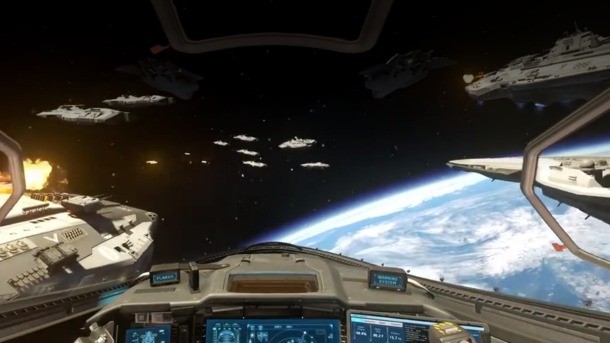Call Of Duty: Infinite Warfare Has More In Common With Mass Effect Than We Expected

Yesterday the trailer for Call of Duty: Infinite Warfare was released, revealing that the series has its eyes set on space. We chatted with Infinity Ward narrative director Taylor Kurosaki and design director Jacob Minkoff about the developer's ambitions and what the team's plan is to set Infinite Warfare apart from every Call of Duty that's come before.
What are you doing to separate this campaign from the previous ones and make it stand out?
Kurosaki: Working at Infinity Ward and on Call of Duty has been an incredible opportunity for us. Being fans of the franchise for a long time, if we could just continue the tradition of the class-leading mechanics and incredible action setpiece moment design that Infinity Ward’s Call of Dutys are known for, and fuse it with a narrative that we feel really strongly about, we thought it would be an incredible combination, like peanut butter cups. And traditionally what we’re focusing on a lot is this idea of seamlessness.
Minkoff: I think in previous Call of Duty games, you had vehicle sequences and maybe underwater combat and various things that you engage in, but for us the exciting thing has been to create all of these sequences as a holistic experience, so now you’re playing as one character and he's a pilot, and you get to fly his fighter jet and you get to customize it. You get to command your ship to go to a particular location and launch out in your fighter jet, jump out into zero-g, fight along the surface of an enemy ship, breach the side of the ship, and engage in boots-on-the ground combat inside the ship. Once inside, you can scuttle it, steal enemy intel from it, and get the heck out and back to your ship and order it to another location.
And so much of this is without loading screens, totally seamless, so it’s a much different experience.
Can you tell us about the The Retribution, the ship your character commands, and how it functions in the game?
Minkoff: The UNSA carrier The Retribution is the hub for all of your missions. It is the ship that Reyes, the protagonist, captains. Reyes is a SCAR, which stands for Space Combat Air Recon, a spec-ops group that has been trained to fight in space. He’s been assigned to The Retribution, but when a devastating sneak attack destroys most of the combined fleets of Earth, the ship takes heavy damage, the captain is killed, and Reyes is the highest ranking officer aboard so he becomes commander of The Retribution.
At that point, he is now tasked with this underdog challenge of fighting off the remaining settlement defense force fleet and protecting Earth. When you get aboard The Retribution, you can talk with various crew members, like the officer who controls all flight deck operations or the one who handles your loadout and armory. There’s your navigator who will take your ship wherever it needs to go to. By talking with these people you can mechanically engage with all the upgrades and mission choice and all that stuff, but then also emotionally you understand the weight of your responsibility as leader. The Retribution has thousands of people aboard and your responsibility is to them, your crew, while also to the mission and the billions of people back home, and it’s this very difficult, emotional challenge that a leader has, which I think is going to be one of the unique, interesting parts of Infinite Warfare.
Is there any continuity with Infinite Warfare and Modern Warfare or even Ghosts? Do they occur in the same timeline?
Minkoff: There will be little things for big fans to find in there, but we’re not gonna talk about plot right now.
How does space in Infinite Warfare affect Call of Duty’s core combat?
Minkoff: The core loop of Call of Duty is ducking behind cover, gun in hand, and shooting guys. But there are variations on that between these moments. Zero-g is one of those variations that will allow you to go from flying your Jackal to boots-on-ground, fighting in a ship. We talked to our military consultants – we have two Navy SEALs we work with and one naval bridge officer – and asked them, “Okay, we’re fighting in space, what are the things you need to quickly get behind cover and move across the space and close distance?” and all of that. So we talked to them about what they would want and we worked out a core series of abilities that the player has, like thrusters that allow you to quickly move across space, like a grappling hook that allows you to attach to the surface of an object using your mag boots, which are another element. We also have non-axis aligned combat, so up isn’t always up, it’s whatever the surface you’re standing on, however it’s curved, that’s up. It’s all relative. The goal with the environment is to give you the means to move as quickly as possible from surface to surface to get inside a ship and do what you need to do.
Call of Duty has a rich history of bringing in actors who lend their likeness and voices to the campaigns, like Kevin Spacey in Advance Warfare. What acting talent will Infinite Warfare feature?
Kurosaki: We’re not really talking specifically about who is in the game right now, but what I can tell you is that we’ve talked about Brian Bloom (Wolfenstein: The New Order, Dragon Age: Inquisition). Brian Bloom is the actor portraying Commander Nick Reyes and Brian is a veteran screen actor as well as in a lot of other games. He’s also one of the writers for Infinite Warfare, which is important to us. Brian has worked on both Ridley and Tony Scott’s films, penned the A-Team movie, and consulted on many games. So he’s the one talent we’re talking about but what I can say is that the rest of our cast are all very well-known movie and television actors who are all on your favorite HBO and Showtime shows – things of that nature – and films as well.
One of our big advantages is that we do work in Los Angeles where the vast majority of the Hollywood talent is, so we don’t have to shoot over the course of two weeks. What we can do is have our shooting schedule mirror that of a feature film or like a high-end Netflix episodic television series, because we have access to these actors. And we think that nets a much better narrative fidelity working with actors of this caliber alongside our Navy SEAL advisers and things like that on set.

Get the Game Informer Print Edition!
Explore your favorite games in premium print format, delivered to your door.
- 10 issues per year
- Only $4.80 per issue
- Full digital magazine archive access
- Since 1991









